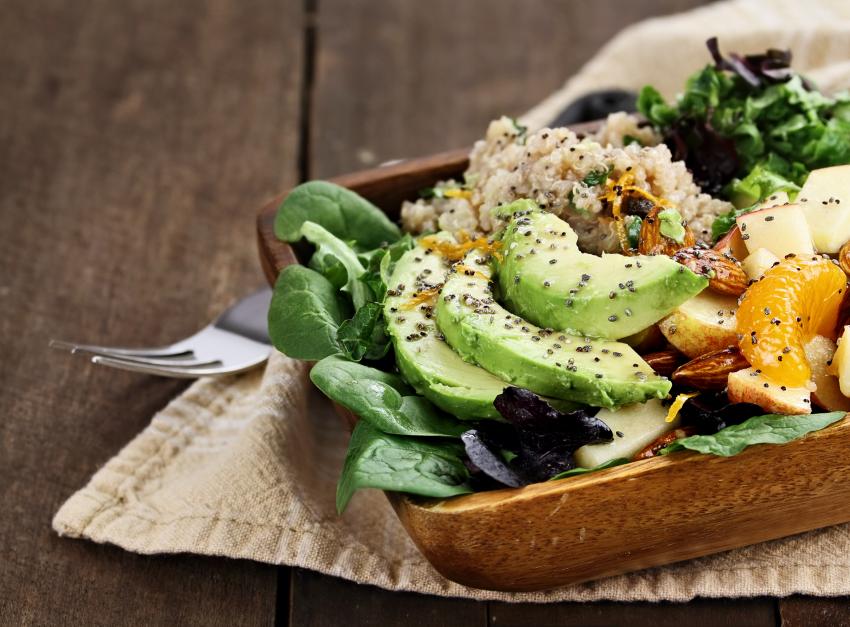
- Ali
For decades we’ve believed that it is Fat that makes us Fat. Not so, we’re coming to understand that not all fats are equal and many of the healthy fats are essential to our wellbeing.
Many of us have clamoured for the latest health fad or ‘revolutionary new diet’ in the hopes of dropping pounds and feeling great. One of the biggest misconceptions is that fat makes you fat. Our society is obsessed with low-fat and fat-free products thinking they are healthier than their standard alternatives. We are now coming to understand that this isn’t so. The majority of foods that are labelled low-fat or fat-free are refined processed foods in which the fat has been replaced with sugar in is many guises.
Many fats are very healthy, essential to our wellbeing, and can even promote weight loss. Our body requires fat in order to function properly and many necessary vitamins, such as A, D, E, and K are fat-soluble, meaning the only way your body can absorb them is in the presence of fat. Every cell in our body contains an outer fatty layer so we need to consume good fats to keep these cells strong and healthy and this in turn keeps us strong and healthy.
So what do I see as a good fat and where do I get it from?
Here are my ‘go to’ good fats and the foods I incorporate in my daily diet. I’ve found that embracing these healthy fats is good for mind and body. I don’t feel hungry and by focusing on the things I can eat, and not on the things I can’t, I’m better able to manage my cravings and get a healthy balance into my daily routine. Good fat helps to reduce sugar cravings, makes you more alert and improves the look and feel of your skin, hair and nails.
Avocados
Avocados are fantastic fruits with tons of nutritional benefits. They are an excellent source of glutathione, a powerful antioxidant that helps cleanse and protect your body by detoxifying, removing heavy metals, and fighting free radicals. Glutathione helps maintain a healthy immune system and slows the ageing process. They help to lower blood pressure and because they are creamy and full of filling good fats they are great as a mid afternoon snack to keep you full until supper. They are also the best fruit source of Vitamin E, which protects against many diseases and helps maintain overall health.
Not only are avocados packed with nutrients, but studies have shown that certain nutrients are absorbed better when eaten with an avocado. Enjoy an avocado in a salad to help you absorb the other nutrients present, on a sandwich, or blended into a smoothie. I add avocado to my daily smoothie. Not only does it smooth out the texture but it adds healthy fats which enables me to absorb more of the nutrients from within my smoothie.
Nuts
Like avocados they contain good fats so are super filling and packed full of protein too. They’re also full of B vitamins which help reduce stress. Nuts are one of the best sources of alpha-lenolenic acid, a type of heart-healthy omega-3. Omega-3s offer numerous health benefits from lowering cholesterol to disease prevention. They are also rich in L-arginine, an amino acid that has been shown to boost immune function, promote wound healing, improve blood vessel function, and help manage cardiovascular disease. Additionally, nuts contain soluble fibre and Vitamin E. Fibre helps lower cholesterol and glucose levels while Vitamin E is a powerful antioxidant. Vitamin E is essential for proper immune function, healthy skin, and DNA repair.
Some of my favourites are almonds, walnuts, pecans and brazil nuts. Try them in smoothies, nutrition bars, salads, or on their own. Nut butters are another delicious way to enjoy this nutrient-dense food and added to smoothies create a lovely cheese cakey taste. Link to smoothie recipe or energy bar
Coconut Oil
I’m a great exponent of using coconut oil for cooking as it is more stable at high temperatures. It can also be added to smoothies, oatmeal, and other dishes and is said to offer antimicrobial, antibacterial and anti-cancer properties. It improves digestion, nutrient absorption and intestinal health. In studies it has also been shown to provide cardiovascular benefits and helps manage Type 2 Diabetes. Coconut oil promotes kidney and liver health and supports the immune system. It also benefits metabolism, energy, and weight management.
Coconut oil is made up of 100% fat. However, the structure of fat in coconut oil differs from the traditional saturated fat often found in animal products which we are told to steer clear of. These fats are primarily comprised of long-chain fatty acids while coconut oil has an unusually high amount of medium-chain fatty acids or triglycerides (MCFAs or MCTs), which are harder for our bodies to convert into stored fat and easier for them to burn off than long-chain fatty acids or triglycerides (LCFAs or LCTs).
Olive Oil
Olive oil is such a healthy oil to use especially when baking, and making salad dressing. This fantastic oil is rich in monounsaturated fat and antioxidants such as chlorophyll, carotenoids, and vitamin E.
Olive oil is great for reducing blood pressure, cancer prevention, managing diabetes, and lessening the severity of asthma and arthritis. In fact, including olive oil in your diet can help you maintain a lower, healthy weight.
I always add some healthy fat to salads and often in the form of olive oil in my salad dressing so that I can absorb all the goodness of the salad.
Seeds
Seeds, like nuts, contain a number of heart healthy properties. Seeds are high in fibre, Vitamin E and monounsaturated fats that can help keep our heart healthy and our body disease free.
Healthy seeds are also great sources of protein, minerals, zinc and other life-enhancing nutrients and health promoting minerals such as magnesium, selenium, and zinc.
Some great seeds to include in your diet are flax seeds, chia seeds, pumpkin seeds, and sunflower seeds. Chia seeds, in particular, are considered a superfood due to their extremely high nutrient profile. They are super rich in omega-3s, even more than flax seeds. Plus, they are loaded with powerful antioxidants, fibre, magnesium, phosphorous, manganese, copper, iron, and zinc.
I keep seeds in the fridge to protect their freshness and enjoy a handful at my desk but they can be enjoyed in smoothies, baked goods, nutrition bars, sprinkled on salads, porridge and other foods too.
Oily Fish
Oily fish like Salmon, mackerel, tuna and sardines contain essential fatty acids which serve multiple important health functions in the body.
Oily fish is said to help against cardiovascular disease, prostate cancer, age-related vision loss and dementia. It's a good source of vitamin D, protein, some B vitamins and selenium. It's also a rich source of omega-3 fatty acids, a type of fat that is good for our health.
The benefits of eating at least two portions of fish a week, including one of oily fish, include keeping your blood pressure at a healthy level and improving blood lipids, both of which reduce your risk of cardiovascular disease: the biggest killer in the UK.
You can get your omega-3 from a range of oily fish from tinned sardines and mackerel, an easy option as a topping for a quick lunch in a salad wrap or on gluten free toast, to tuna steaks and salmon fillets.
Here's one of my favourite family friendly recipes for Chinese Five Spice Salmon Burgers, which is lways a hit no matter what age I serve it up to.
I would love to hear from you. What are some of your favourite foods that provide healthy fat and how do you incorporate them into your diet?








